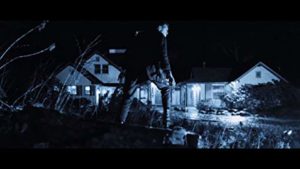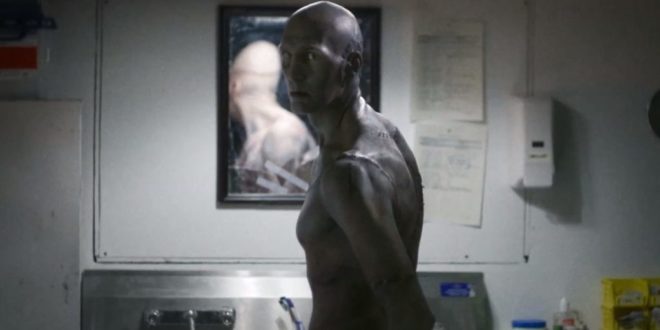Anyone who’s read my reviews knows that I am a HUGE fan of anything Filmmaker Larry Fessenden does. When I interviewed him last year (read that interview here), we talked about his newest project, Depraved, a contemporary tale based on Mary Shelley’s Frankenstein. Larry had mentioned his affinity for the monster, the lonely, misunderstood creature that terrifies us in horror movies but may just be the most sympathetic character in any film. In Depraved, we get a look at Frankenstein’s monster in the way that Mary Shelley always envisioned… a desolate, confused creation rebuilt out of other people’s parts that only reacted to what he had learned in his short, miserable life.

Synopsis:
A disillusioned field surgeon suffering from PTSD makes a man out of body parts and brings him to life in a Brooklyn loft.
Depraved was written, directed, edited, and produced by Larry Fessenden (Jug Face 2013, We Are Still Here 2015 – read our review here, The Ranger 2018 – read our review here). Other producers include Liz Astor (Drugstore Lipstick 2018), Chadd Harbold (Most Beautiful Island 2017 – read our review here) and The Ranger’s Jenn Wexler (read our interview with her here). Composer Will Bates (read our interview with him here) created the beautiful, heartbreaking score. Stake Land’s Peter Gerner, Brian Spears and Ashley K. Thomas worked together once again to create the special FX and prosthetics for the film.
Depraved stars Alex Breaux (Bushwick 2016), David Call (The Sinner TV series), The Blair Witch Project’s Joshua Leonard, Chloe Levine (The Ranger 2018), Owen Campbell (Super Dark Times 2017 – read our review of the film here), Odd Thomas’ Addison Timlin (read our interview with her here) and Ana Kayne (Another Earth 2011).

I actually watched Depraved a few weeks ago, but it’s taken a bit for me to find the words I needed to describe what I had seen. On the surface, the film is about a broken doctor named Henry (Call) who gets in over his head after agreeing to try out his friend, Polidori’s (Leonard), reanimation drugs on what is essentially a pieced together cadaver. He has this being before him that he is pressured to teach the most basic bodily functions and how to respond in society, all in the quickest way possible. Imagine being in his situation, one of responsibility and doubt, pressured to do more by his peers but feeling deep sympathy and even love for his subject.
But dig deeper and you find the tale of a paradigm who has no one in the world that he can relate to. Adam (Breaux) has memories of things he never did and people he’s never met. He looks in the mirror and sees a shattered face – both literally and figuratively – that he does not recognize. His body is pieced together, and not one of those pieces are originally his. Adam is a full grown man who has no control of his bodily functions or even the simplest tasks, like a newborn baby in a man’s body. He was never born; he just became. His wretched heart knows no mother or father, no name or identity. If you’re made up of other people’s parts, who are you? Is the brain in your head even yours? Do you even have a soul?

What Works
There are so many nuances in this film that I loved that it would take me pages to write them all out. However, there are a few standouts that I want to mention. I was very impressed with the fabulous use of lighting. Whenever Adam was relaxed and happy, his world turned soft and sepia-toned, but once his emotions geared up towards anger, fear or frustration, he saw the world in clinical white light, exposing everything round him in stark details. I loved all of the nods to previous Frankenstein films, especially the lightning storm scene. The attention to detail was near obsessive, especially in regards to Gerner, Spears and Thomas’s effects, which were were jaw-droppingly astonishing. Adam’s skin was piebald and patched together like a quilt made out of scraps. His cuts healed a little bit at a time, his stitches came undone, and his hair grew. I can only imagine how many different versions of each scar was created, even if only for a few seconds of screen time.
I applaud Alex Breaux for his role in Depraved. Not only was his acting absolutely perfect, but he also managed to whittle his body down to a ghastly thinness, making the prosthetics all the more gruesome. His dedication to this role is highly commendable, on par with Matt Damon in Finding Private Ryan or Into the Wild’s Emile Hirsch (read our interview with him here).

It was pure torture seeing what Alex’s character had to go through. However, I did still feel for his father figure, Henry (Call), a troubled young man who just wanted to make amends for his sins on the battlefield. He was bullied by a fame-hungry Polidori to partake in this experiment, creating for himself an even bigger weight of sin than what he carried when he first came home from the war. He wanted to be a good role model for Adam, teaching him how to be a good person. But Polidori scoffed at Henry’s affections for “it,” thinking of the man as only an end to a means. When he did participate in Adam’s upbringing, it was only to show him things that he was far too immature to see, events that eventually lead to Adam’s downfall. I have a feeling that Polidori may be named after John William Polidori, the man who wrote the 1819 novel, The Vampyre, written over 50 years before Bram Stoker’s breakout novel.
One of the best scenes in the film happens near the beginning. Young Alex (Campbell) has just left his girlfriend, Lucy’s (Levine), house. As he walks home, he’s accosted by a man in shadow who stabs him to death. That few minutes reminded me of the shower scene in Psycho... the closeup shots of Alex’s face and of the knife stabbing into his body as he grunted and fought for his life; the rain pattering the ground like water droplets from a shower head. It was a perfect homage to the 1960 film. Speaking of Chloe Levine, I loved seeing her in the role of Alex’s girlfriend, Lucy. She’s such a fantastic actress. I’m hoping Larry takes her under his wing as his new Lauren Ashley Carter (read our interview with her here).
I would be remiss if I didn’t mention the song that plays during the final scene. It’s called “More Than Enough” from the Elizabeth & the Catapult album, Like It Never Happened. It was so very perfect for the scene. It’s such a beautiful song… I downloaded it as soon as the film credits rolled.
What Doesn’t Work
I loved so much of this film, and it breaks my heart a bit to admit that there were things I didn’t like. After the seriousness of Depraved’s storyline, it was a little weird and out of context to show the jerky, cartoonish, almost garish lightning bolts in between scenes. It felt like a totally different film and took me out of the story for a moment,

Final Thoughts
Depraved broke my heart. I now realize that science is the most destructive and gruesome type of horror. Never again will I see Frankenstein’s creation as a monster, an entity bent on destruction. This being was made into a monster. He had no choice about what he became. He reacted like anyone would once he found out what happened to him, and to me, this makes him as human as anyone else. As Adam breaks away to struggle through life alone, I can only image what his continued existence would entail. Can he grow stronger? Will he get older? Can he die? What will happen when he stops taking the red pills? Only Larry Fessenden knows, and he’s not telling.
 PopHorror Let's Get Scared
PopHorror Let's Get Scared




